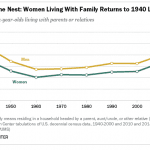The Pregnancy Discrimination Act of 1978 says quite clearly: employers must treat pregnant women exactly as they would any other worker with a similar short-term impairment.
If you allow a man with a heart attack paid short-term leave, then you must permit a woman who’s required to be on bed rest a similar paid leave. If you permit a cashier who broke her leg to do the job sitting, then you must similarly accomodate a pregnant woman who’s been told not to be on her feet all day. If you allow a man with a broken arm light duty in a job which ordinarily requires heavy lifting, you must similiarly provide this accomodation to a pregnant woman who’s restricted in how much she can lift due to her pregnancy.
On the face of it, then, Peggy Young, who’s suing UPS for denying her the accomodation she requested, simply has no case, because she’s being treated just like any other similiar-situated worker. Is there a bit of wiggle room? It is true that UPS accomodates workers who were injured on the job, but not those injured off the job — is the crux of her argument that accomodations due to pregnancy should be added to the former, rather than the latter category? I don’t really think so.
So far as I can tell, Young and her supporters want to rewrite the law. Their argument — and it’s appeared in multiple articles, all of which I read, and X’ed out of yesterday — is that a pregnant woman should be accomodated, not just “to the same degree as anyone else with a short-term impairment” but more absolutely, and regardless of whether employers accomodate others or not.
And this question is not one that the Supreme Court should be answering. This is the role of the legislature. And, just as Obama doesn’t have the right to usurp legislative powers, neither can the Courts, and I don’t expect them to in this case.
And imagine that Congress does indeed decide that imposing accomodation requirements is an easy, feel-good legislation. Henceforth, employers must accomodate restrictions imposed on a pregnant woman, ranging from mild accomodations such as the ability to bring along a water bottle or be seated while working to more significant accomodations such as reassignment to “light duty,” so long as it’s prescribed by the doctor and not an undue burden, with nicities such as “if ‘light duty’ is generally a lower-paid position, does the employee get a temporary pay cut?” or “when (e.g., in retail) is standing an important part of the job duties, and when not?” to be resolved later. Is this, then, unfair to someone whose actual injury isn’t accomodated?
And I say this not because I’m anti-pregnant-woman. Look, with my first child, and to a lesser extent with the others, I had a lot of morning all-day sickness — no, not puking all the time, but just generally feeling lousy. I benefitted a great deal from the flexibility I had, and (don’t tell my boss) a lot of the “study time” I took (that’s how actuarial exams work — your employer grants you a certain number of company time each exam sitting to study, as well as the personal time you take) I actually spent on a late-afternoon nap. So employer flexibility is great. But it is not, now, the law, and if we want to legislate this as a requirement, then we’d better be certain there aren’t going to be unintended consequences to insufficiently-thought-out legislation.
UPDATE: googled a bit more; according to SCOTUSblog, Young’s case seems to be that the number of “exceptions” UPS offers to the “no accomodation” policy are so extensive that these “exceptions” really become the norm and pregnancy becomes one of a very small number of instances in which workers are not accomodated. Don’t know about that argument. In any case, what’s being argued in the public square is different.












